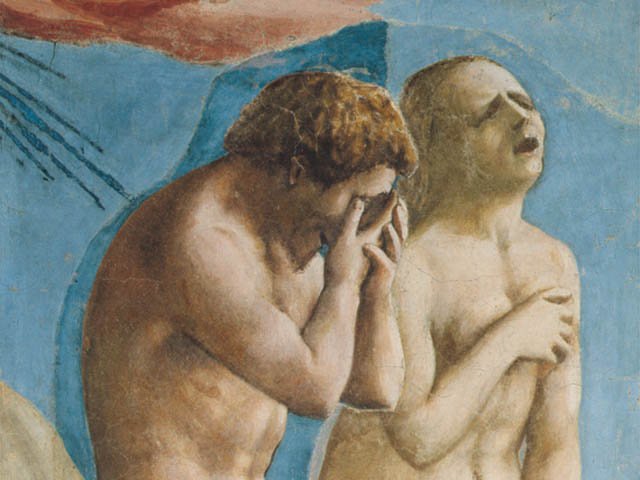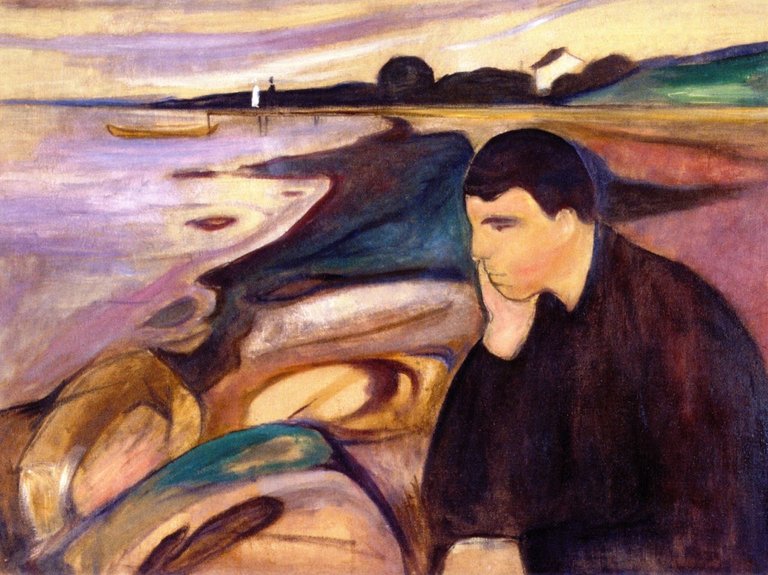Expulsion From the Garden of Eden

Credit: Masaccio (1401-1428). Public domain.
I couldn't decide if I should add a personal note to this blog or not. But without the note, there didn't seem to be much reason for writing. So here is a bit of information: I didn't see my father from 1958, when I was eleven, until 1988, when he died. As he entered old age, I didn't try to visit him, or contact him.
And yet, I feel no guilt.

What causes guilt? Where does it come from? One clinical psychologist from the UK offers a rather succinct summary:
...guilt is a feeling of remorse or sadness over a past action, experienced when we think we’ve caused harm or breached our moral code
Do we need guilt? Most sites I consulted for this blog assert that guilt is an adaptive response to wrongdoing. As a matter of fact, the inability to feel guilt may actually be a symptom of psychopathy. But is it possible to feel too much guilt? 'Too much' guilt is a bad thing. That's what a lot of sites on the Internet say.
Guilt

Credit: Rallé. Used under CC 3.0 license.
Personal growth guru Tony Robbins, for example, instructs us on How to Stop Feeling Guilty. We must 'forgive ourselves', and must 'change our negative self-talk'. If we have done a wrong to someone, we can 'apologize'. If that is not possible, we should drive out the 'negative thoughts' with 'positive thoughts'. Then we should learn from our mistakes: "...find the lesson," he advises, "– and then don’t let it happen again."
But is it really true that guilt is bad for us? I make a distinction here between guilt and shame. These are quite separate emotions. A 2017 article published in the journal Behavioral Science explains:
Within the field of guilt and shame two competing perspectives have been advanced. The first, the social-adaptive perspective, proposes that guilt is an inherently adaptive emotion and shame is an inherently maladaptive emotion.

Although in vernacular speech the terms guilt and shame may sometimes be used interchangeably, there actually is a significant difference between the two. Psychologist/psychoanalyst Richard Burgo explains in Psychology Today:
- Guilt involves the awareness of having done something wrong; it arises from one's actions.
- Shame is the painful feeling about how one appears to others (and to oneself) without having done anything.
In considering guilt, and only guilt, there is a generally acknowledged burden, a sense of responsibility that comes from having done something 'wrong'. Wrong of course is a value term. When it comes to guilt, it is dependent upon one's personal values, one's sense of right and wrong.
Soul in Bondage

Credit: Elihu Vedder (1836-1923) Public domain.
As an article in Clinical Psychology Review suggests, part of the problem in discussing guilt is defining terms. After reviewing 23 sources, the authors of this article come to the conclusion that there is "...a lack of conceptual clarity...Measures of guilt do not correspond well to the definitions from which they derive".
Despite the difficulty in coming to an agreement on terms and definitions, the authors offer this: central to feelings of guilt is a "focus on one’s action or inactions involving real or imagined moral transgressions." Guilt is personal and therefore difficult for a researcher to quantify or define.

Some Studies on the Weight of Guilt:
The heading of this section, "The Weight of Guilt" is chosen deliberately. One consequence of guilt that keeps popping up in studies is weight gain.
From Stigma Health
Weight stigma facilitates unhealthy eating and weight gain...
and
...we found that perceived weight stigma predicted weight gain over (a) 10-week period

Perceptions of weight stigma are said to lead to maladaptive eating behavior and weight gain. As a matter of fact, according to some studies, guilt about being overweight may actually decrease physical activity.
According to an article in Obesity Science and Practice
Perceiving one's weight as ‘too heavy’ is associated with lower levels of physical activity and higher levels of sedentary behaviour.
and
...the mechanisms underpinning the associations between weight perception and lifestyle behaviours have not been identified...the self‐conscious emotions of shame and guilt may mediate these associations.

In addition to the weight gain that may be associated with guilt, there is another weight-related phenomenon: the sense of feeling heavy.
Research out of Princeton University describes how people are literally 'weighed down' by guilt. The researchers report that
...recalling personal unethical acts led participants to report increased subjective body weight... We also found that this increased sense of weight was related to participants’ heightened feelings of guilt...
An interesting consequence of this increased sense of weight was that the feeling influenced the study participants' overall sense of fitness to fulfill physical tasks.
...those who recalled unethical memories, which can be accompanied by sensations of weight, perceived the physical behaviors to involve even greater effort to complete (tasks) compared to ratings provided by those in a control condition.
Melancholy

Credit: Edvard Munch. Public domain
Guilt and Depression
Major Depressive Disorder (MDD) is a condition recognized by the American Psychiatric Association. The Mayo Clinic offers a description of the symptoms for MDD. Included in the list is this:
...feelings of worthlessness or guilt, fixating on past failures or self-blame
The association between guilt and depression is quite strong (in the literature). For example, the Atlantic Magazine cites research that shows children who suffer from an inordinate sense of guilt, have a higher risk of suffering major depressive disorder as adults.

An article in WebMD discusses the relationship between guilt, depression, anxiety and obsessive/compulsive disorder (OCD). The authors of this article explain, "Guilt is intertwined with other disorders, and separating them can be a challenge."
In the case of OCD, the authors assert, "OCD is all about recurring thoughts (obsessions) and actions (compulsions) that are uncontrollable. Guilt can act as a predecessor or an enabler for OCD." In the case of depression, the authors write, "The relationship between guilt and depression forms a swirling pool of negative thinking. They can often spiral out of control, feeding off each other until they are consuming."

I Do Feel Guilty, But Not About My Father
I was brought up Catholic, so of course I feel guilt. Even for people who are no longer practicing Catholics, examining conscience is an unbreakable habit. Accepting penance for sins committed is part of a Catholic's DNA. However, when it comes to my father, there is no sin to repent.
When I was eighteen I received a letter from my father. In it he wrote: I wish you all the best, besides which I have nothing further to offer you. This letter was the first time I'd heard from my father in seven years. I never heard from him again.
That letter was my father's gift to me. It was a release from any doubt I might have had about filial obligation. I don't have the sense that I have caused harm, or breached a moral code. Though I may feel guilt about many sins of omission and commission in my life, on this one I get a pass.


The idea for this blog came from the Inkwell Nonfiction prompt that was offered last week: Letters. I didn't want to write something very personal, so I made this a science blog for one of my favorite communities, @stemsocial.
Illustrations not Credited in the Post
Two accent pieces are mine (I created them):
- This
 and this
and this 
Two were derived from images I borrowed from LIL, the LMAC Image Gallery:
- Fractal
 from @redheadpei
from @redheadpei - Flower
 from @muelli
from @muelli
Research Sources:
https://www.axahealth.co.uk/health-information/mental-health/resilience/what-causes-guilt-and-how-to-overcome-it/
https://www.ncbi.nlm.nih.gov/pmc/articles/PMC5746692/
https://www.nature.com/articles/s41598-019-43727-0
https://www.webmd.com/mental-health/signs-guilt
https://www.tonyrobbins.com/personal-growth/how-to-stop-feeling-guilty/
https://www.ncbi.nlm.nih.gov/pmc/articles/PMC5746692/
https://www.psychologytoday.com/us/blog/shame/201305/the-difference-between-guilt-and-shame
https://www.scu.edu/ethics/ethics-resources/ethical-decision-making/ethical-relativism/
https://www.ncbi.nlm.nih.gov/pmc/articles/PMC4119878/
https://www.ncbi.nlm.nih.gov/pmc/articles/PMC6132275/
https://www.ncbi.nlm.nih.gov/pmc/articles/PMC7448164/
https://www.princeton.edu/news/2013/10/08/weighed-down-guilt-research-shows-its-more-metaphor
https://www.mayoclinic.org/diseases-conditions/depression/symptoms-causes/syc-20356007
https://www.webmd.com/mental-health/signs-guilt
https://www.theatlantic.com/health/archive/2015/01/childhood-guilt-adult-depression/384176/
https://www.americamagazine.org/faith/2018/07/11/when-catholic-guilt-gets-way-catholic-faith
https://www.ncbi.nlm.nih.gov/pmc/articles/PMC3670430/
https://psycnet.apa.org/doiLanding?doi=10.1037%2Fh0032836
https://pubmed.ncbi.nlm.nih.gov/7318342/
https://doi.org/10.1037/h0032836
https://psycnet.apa.org/record/1973-24305-001
https://www.sciencedirect.com/science/article/abs/pii/0277953694001219
https://www.psychologytoday.com/us/blog/never-binge-again/201812/does-guilt-make-you-fat


